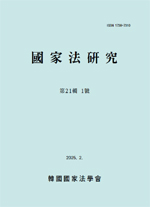2025 대통령 탄핵결정에서 ‘비상계엄 선포’의 법위반 여부 판단에 대한 비판적 검토 : 헌법 제77조 제1항의 해석과 비상계엄 선포의 실체적 요건에 대한 판단을 중심으로
A critical review of the interpretation of the requirements for the declaration of ‘state of emergency for martial law’ in the reasoning of the Constitutional Court of Korea’s impeachment judgment in 2025
- 12

헌법재판소의 2025 대통령 탄핵결정은 위헌·위법적 비상계엄선포와 헌정중단 위기에 대해 정상적인 헌법재판제도가 기능하여 헌법을 수호한 것이라는 점에서 중요한 의미를 갖는다. 이러한 헌법재판소 결정의 헌정사적 의의에도 불구하고, 2025 대통령 탄핵결정의 구체적인 내용에 있어서 비상계엄 선포의 실체적 요건에 대한 헌법재판소의 해석 및 그 적용을 통한 판단에 대해 비판적 검토가 필요한 측면이 있다. 헌법재판소가 12·3 비상계엄 선포의 법위반성을 심사하면서, 헌법 제77조 제1항의 비상계엄 선포의 실체적 요건을 충족하였는지에 대해 판단한 내용은, 결론적으로 헌법의 비상계엄 선포의 실체적 요건을 충족하지 못하여 헌법에 위반된다는 것이지만, 그 과정에서 헌법 제77조 제1항의 비상계엄 선포 요건에 대한 해석을 확대(또는 확대를 전제로 적용)한 것이 아닌가 하는 문제가 있다. 비상계엄을 선포할 수 있는 상황으로서 헌법 제77조 제1항의 ‘전시, 사변 기타 이에 준하는 비상사태’는 군에 의한 통치라는 계엄의 본질적 성격, 예외성과 최후수단성, 역사적 연원, 계엄의 헌법제도화의 목적, 특히 우리 헌법사에서의 계엄 악용의 역사에 대한 반성적 고찰 등을 고려할 때 기본적으로 전시상황이 객관적으로 발생했을 것을 의미하는 것으로 해석해야 하며, ‘사변’, ‘기타 이에 준하는 비상사태’ 또한 기본적으로 전시를 지향하는 개념으로 해석해야 한다. 그러지 않고 전시와 무관한, 비전시의 각종의 국가비상사태들을 광범위하게 포괄할 수 있는 것으로 확대하여 해석해서는 안된다. 그리고 헌법 제77조 제1항의 계엄선포의 실체적 요건은 기본적으로 전시상황의 발생을 객관적으로 전제하고 나서, (전시상황이라고 해서 항상 계엄이 선포되어야 하는 것은 아니므로) 전시이면서도 그 정도가 심각한 위기상황이어서 예외적으로 군병력을 동원하지 않고는 경찰력만으로는 질서유지가 불가능한 정도로써 병력동원의 필요성이 인정되고, 군사상 필요에 응하거나 공공 안녕질서 유지의 필요에 응한다는 목적 요건이 충족되어, 즉 헌법상 요건과 계엄법에서 구체화하고 있는 요건까지 충족하였을 때 비로소 계엄을 선포할 수 있는 것으로 엄격하게 해석해야 한다. 따라서 2025 대통령 탄핵결정에서 피청구인 윤석열의 12·3 비상계엄 선포가 비상계엄 선포의 실체적 요건을 충족한 것인지의 판단은, 설령 피청구인이 더불어민주당, 국회의 탄핵 남발, 입법독재 등으로 인한 국가비상사태여서 계엄을 선포한 것이라고 주장하였다 하더라도, 헌법상 비상계엄 선포의 실체적 요건은 기본적으로 전시 또는 전시에 준하는 무장 폭동 상황에서의 국가비상사태에서 병력동원이 요청되는 정도의 위급성과 비상계엄 선포의 목적요건을 충족하고 최후수단으로서 행사될 수 있는 것임을 밝히고, 피청구인의 심판대상 행위는 이러한 비상계엄 선포의 객관적 상황요건을 처음부터 충족하지 않은 것으로서 위헌이라고 판단하였어야 한다.
The Constitutional Court’s decision to impeach President Yoon Seok-yeol in 2025 is significant in that it demonstrates the Republic of Korea faced a constitutional crisis due to the unconstitutional declaration of a state of emergency for martial law by the president, yet the normal constitutional adjudication system functioned to uphold the Constitution. Despite the historical significance of this decision by the Constitutional Court, it is necessary to critically review the specific argumentative process of the 2025 presidential impeachment decision. When examining the legality of the state of emergency declaration on December 3rd, the Constitutional Court judged whether it met the constitutional requirements for declaring a state of emergency for martial law as outlined in Article 77, Paragraph 1 of the Constitution, ultimately concluding that it did not satisfy the substantive requirements established in the Constitution and was therefore unconstitutional. However, there is an issue in this argumentative process related to the broadening interpretation of Article 77, Paragraph 1, which expanded the requirements for declaring a state of emergency. When interpreting the ‘state of war, emergencies, and other equivalent extraordinary circumstances’ stipulated in Article 77, Paragraph 1 of the Constitution, it must be interpreted strictly, considering the essential nature of martial law, its exceptionality and last resort character, its origin and history, and the purpose of constitutionalization of martial law. Therefore, a state of emergency should fundamentally be interpreted to mean that a situation of war has objectively occurred. Similarly, the terms ‘emergency’ and ‘other equivalent extraordinary circumstances’ should also be interpreted fundamentally as referring to a situation of war. If various types of national emergencies unrelated to war are interpreted as being widely includable, there is a risk of abuse of the power to declare martial law. And the substantial requirements for the declaration of martial law under Article 77, Paragraph 1 of the Constitution must fundamentally presume the occurrence of a wartime situation. Furthermore, it should be interpreted that martial law can only be declared in exceptional cases where a serious crisis situation occurs during wartime, necessitating the deployment of military forces. Therefore, in the decision on the impeachment of the president in 2025, the process of determining whether Yoon Seok-yeol’s declaration of martial law on December 3 meets the substantive requirements for declaring martial law should be as follows: The substantive requirements for declaring martial law under the Constitution fundamentally pertain to a national emergency, such as armed rebellion equivalent to war, with a degree of urgency that necessitates the mobilization of forces, fulfills the purpose requirements for declaring martial law, and can be exercised as a last resort only when unavoidable. It should have been concluded that the actions of the respondent subject to judgment did not meet these objective situational requirements for the declaration of martial law from the beginning and were unconstitutional.
Ⅰ. 서론
Ⅱ. 헌법재판소의 2024헌나8 대통령 윤석열 탄핵심판 결정의 주요내용
Ⅲ. 비상계엄 선포의 실체적 요건에 대한 해석·적용과 12·3 비상계엄 선포의 법위반 여부 판단의 문제점
Ⅳ. 헌법 제77조 제1항의 비상계엄 선포 요건에 대한 해석론의 재검토
Ⅴ. 결론
참고문헌
(0)
(0)